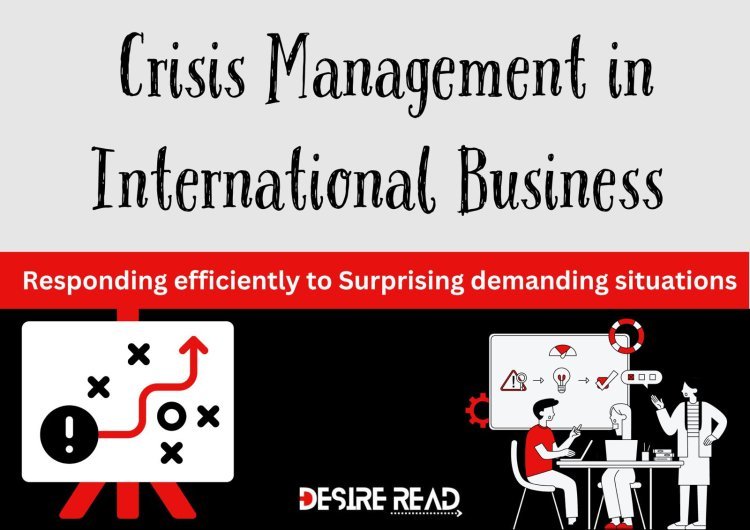Crisis Management in International Business
Crisis Management in International Business: Responding efficiently to Surprising demanding situations

Crisis management is a scientific, ordinary reaction to crises that gives the corporation the ability to address surprising challenges. Crisis control in the worldwide enterprise is particularly complex and multifaceted, as companies are suffering from many crises and disaster-like activities that are commonly no longer associated with ordinary operations. Crisis management can be effective in preventing or managing crises via early detection. A crisis in worldwide business can encompass up to four separate and distinct levels: the prodromal disaster section, the acute crisis section, the persistent crisis section, and the crisis resolution section.
Effective disaster control requires identifying those ranges and coping with them successfully. Emergency control planning has emerged as an essential topic in worldwide commercial enterprise, and it involves building an emergency management crew, assessing vulnerabilities, growing proactive strategies, enforcing an emergency management plan, and studying actual operations. The trick to making effective selections in a disaster is to permit movement of what you can't manipulate and recognition of what you can. Decision-making may be difficult during a crisis, however amassing statistics, constructing a team, and specializing in what you could control can result in an effective choice.
What are some not unusual varieties of crises in the global commercial enterprise?
Multinational corporations can face many types of crises, which include natural failures, technological problems, terrorist assaults, theft, changes in authority policies, business alliances, financial crises, employee crises, organizational crises, confrontational crises, place of job violence crises, criminal crises and fraud. Crises, management errors and distorted management values
In addition, worldwide exchange can be stricken by political instability, adjustments in authorities, unrest, and cyber security threats and their powerful managing
To manage crises in global trade, it's miles important to have a crisis control plan, shape an emergency control crew, investigate vulnerabilities, increase proactive strategies, put into effect the plan, and analyze real performance.
what are some strategies for effective decision-making during a crisis in international business?
Effective selection-making in the course of a global enterprise crisis may be finished through the following techniques:
Gather records: Gather statistics from numerous assets, such as internal and external stakeholders, to make knowledgeable choices
.
Focus on what you can control: Let move of the belongings you can't manage and recognize the aspects of the disaster that you can control
.
Formation of an emergency control team: Appoint a crew that consists of domain experts, choice makers, and other stakeholders
.
Developing Proactive Strategies: Visualizing Proactive Strategies and Evaluating Their Effective in Reducing Risks
Implementing a Crisis Management Plan: Training Personnel and Implementing a Crisis Plan to Reduce Potential Risks
Slowdown: Reserve time to think before making a decision, even if under time strain
Encourage all team contributors: make sure all participants of the emergency management group have a voice and that their worries are addressed.
Challenging Assumptions: actively listen to distinct factors of view and bear in mind looking for human beings and information that task reviews.
Ensure Intelligence Authenticity: Ensure the accuracy of essential intelligence for choice-making
Consider Multiple Options: Develop and recall multiple options to address the instantaneous situation and destiny impacts
These strategies assist multinational companies make powerful selections throughout a disaster, making sure of commercial enterprise continuity and protecting their reputation.
.
How can businesses communicate effectively in the course of a crisis in worldwide exchange?
To speak efficiently in the course of a global business disaster, organizations have to:
Create a crisis verbal exchange plan that outlines dreams, disaster management crew contributors, target corporations and numbered measures. Name a crisis conversation organization that should consist of professionals, choice-makers and different stakeholders. Use more than one verbal exchange channels to attain shareholders, such as social media, electronic mail, telephone and in character. Provide correct records about the business enterprise and the state of affairs, even supposing it's far damaging to the organization. Show empathy and compassion in all factors of communique, recognize shareholders, and; By following these techniques, groups can speak efficiently in the course of an international commercial enterprise disaster, defend popularity, keep clients considered, ed and limit the effects of the crisis.
Conclusion
In summary, disaster control is an important part of an international enterprise that calls for a proactive and strategic method to efficiently reply to sudden demanding situations. Well-prepared businesses with a disaster management plan are better prepared to mitigate the effects of crises on their operations, reputation, and consequences. Effective emergency management involves identifying capacity dangers, developing an emergency management plan, schooling a group of workers, and regularly reviewing and updating the plan to ensure its relevance and effectiveness. It also requires clear communication, transparency, and collaboration with stakeholders, together with personnel, clients, providers, and the media. By responding successfully to sudden challenges, organizations can't most effectively limit the bad results of crises, however also grow to be more potent and greater resilient in the face of future demanding situations.
.













